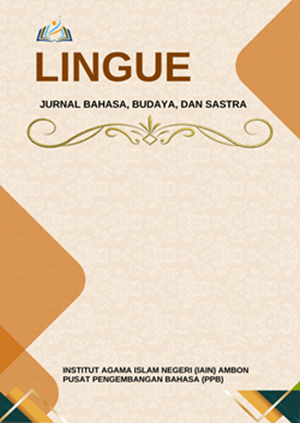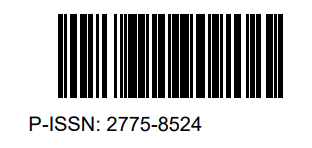ANALYSIS OF STUDENT COMPETENCE IN WRITING SCIENTIFIC PAPERS BASED ON INFORMATION TECHNOLOGY (IT)
DOI:
https://doi.org/10.33477/lingue.v7i1.9777Keywords:
academics, scientific works, writing competenceAbstract
Globally, this article is related to students' competence in writing articles. This article aims to describe the content of scientific works as the product of the writing learning process based on information technology (IT). A qualitative descriptive method is used to analyze the data, with its application adapted to the guidelines of the conceptual study and theory of the writing process, writing needs analysis for scientific works, and empirical studies on the current conditions of IT-based scientific writing learning. The data analysis techniques in this research involve data reduction, data presentation, and conclusion drawing. The research findings indicate that, in general, students are still categorized as not fully understanding information technology on one hand. However, the scientific works in the form of articles and theses were rated as "good" based on 10 indicators of scientific work assessment. Meanwhile, the use of Bahasa Indonesia in communicating arguments, ideas, and main issues was classified as effective, as the choice of words, sentence usage, and paragraph structure met the requirements for proper and correct language use.
References
Abdullah, M. (2004) Menembus Jurnal ilmiah Nasional dan Internasional: Petunjuk Ringkas Penulisan Paper hingga Koreksi Proof. Jakarta: Gramedia Pustaka Utama.
Alwasilah, A. C. & S. Suzanna A. (2005). Pokoknya Menulis: Cara Baru Menulis dengan Metode Kolaborasi. Bandung: Penerbit Kiblat.
Blumner, J. S. (2008). “Beyond the Reactive: WAC Programs and the Steps Ahead” dalam Journal on Writing Across the Curriculum. Michigan, USA: University of Michigan.
Borg, W.R. & Gall. M.D. (1979). Educational Research: An Introduction. New York and London: Longman.
Bühmann, D., and B. Trudell. (2008). Mother Tongue Matters: Local Language as a Key to Effective Learning. Paris: UNESCO.
Cahyani, I. (2005). “Pengembangan Model Pembelajaran Menulis Bermuatan Kecakapan Hidup untuk Meningkatkan Kebermaknaan Pembelajaran Bahasa Indonesia”. Laporan Penelitian Tidak Diterbitkan. Bandung: Lemlit UPI [Lembaga Penelitian Universitas Pendidikan Indonesia].
Crystal, D. (2000). Language Death. United Kingdom: Cambridge University Press. Djuharie, O. S. & Suherli. (2001). Panduan Membuat Karya Tulis. Bandung: Yrama
Widya.
Freyhofer, H. (2008). “I Hate History Papers” dalam Journal on Writing Across the Curriculum, Volume 11. Michigan, USA: University of Michigan.
Gipayana, M. (2002). “Pengajaran Literasi dan Penilaian Portofolio dalam Pembelajaran Menulis”. Disertasi Doktor Tidak Diterbitkan. Bandung: PPs UPI [Program Pascasarjana Universitas Pendidikan Indonesia].
Gunarwan, A. (2011). Reversal of Regional Language Shift to Strengthen Nation's Culture in the book on Indonesian Language Empowerment Strengthening Nation's Culture in the Era of Globalization: Minutes of Indonesian Language VIII Congress, Language Development and Coaching Agency.
Hammer, S. (2007). Demonstrating quality outcomes in learning and teaching: examining ‘best practice’ in the use of criterion-referenced assessment. International Journal of Pedagogies and Learning, 3(1), 50-58. https://doi.org/10.5172/ijpl.3.1.50
Herschinger, E. (2012). "Hell Is the Other": Conceptualizing Hegemony and Identity through Discourse Theory. Millennium: Journal of International Studies, 41 (1), 65–90. DOI: 10.1177 / 0305829812449501
Ivanova, M. N. (2011). Housing and hegemony: The US experience. Capital & Class, 35 (3), 391–414. DOI: 10.1177 / 0309816811417840.
Jessen, A. & Elander, J. (2009). Development and evaluation of an intervention to improve further education students' understanding of higher education assessment criteria: three studies. Journal of Further and Higher Education, 33(4), 359-380. https://doi.org/10.1080/03098770903272461.
Jacobs, H.L. et al. (1981). Testing ESL Composition: A Practical Approach. London: Newbury House Publishers, Inc.
Joyce, Bruce, Masrsha Weil & Emily Calhoun. (2000). Models of Teaching. Boston: Allyn and Bacon.
Kellog, Ronald T. (2008). Training Writing Skills: A Cognitive Developmental Perspective Journal of Writing Research. USA: Department of Psychology, Saint Louis University.
Kumar, N. (2010). Representation, Hegemony and Governance. History and Sociology of South Asia, 4 (1), 75–84. DOI: 10.1177 / 223080751000400104.
Maags, C. (2018). Cultural Contestation in China: Ethnicity, Identity, and the State in Cultural Contestation. Rodenberg, J., & Wagenaar, P. (Eds.). Switzerland: Palgrave Macmillan.
Muno, W., & Brand, A. (2014). Farewell to leadership? Ideas of hegemony and counter-hegemony in the Americas. International Area Studies Review, 17 (4), 375–393. DOI: 10.1177 / 2233865914550728.
Munthe, B. (2009). Desain Pembelajaran. Yogyakarta: Insan Madani Pustaka. Narotzky, S. (2016). On waging the ideological war: Against the hegemony of form.
AnthropologicalTheory,6(2-3), 263–284.DOI:10.1177/1463499616652518.
Nurgiantoro, B. (1995). Penilaian dalam Pengajaran Bahasa dan Sastra. Yogyakarta: BPFE-Yogyakarta.
Ouane, A., & C. Glanz. (2011). Optimizing Learning, Education and Publishing in Africa: The Language Factor - A Review and Analysis of Theory and Practice in Mother-tongue and Bilingual Education in Sub Saharan Africa. Hamburg: UNESCO Institute for Lifelong Learning. Feldbrunnenstrasse 58.
Rijlaarsdam, G. (2008). “Observation of Peers in Learning to Write” dalam
Journal of Writing Research. London: Elsevier.
Riera-Gil, E. (2018). The communicative value of local languages: An underestimated interest in theories of linguistic justice. Ethnicities, 146879681878631. DOI: 10.1177 / 1468796818786310.
Robert, W. Cox, (1981). 'Social Forces, States and World Orders: Beyond International Relations Theory', Millennium: Journal of International Studies 10, No. 2: 139.
Rodenberg, J., & Wagenaar, P. (2018). Cultural Contestation: Heritage, Identity, and the Role of Government in Cultural Contestation. Rodenberg, J., & Wagenaar,
P. (Eds.). Switzerland: Palgrave Macmillan.
Ross, M. H. (2007). Cultural Contestation in Ethnic Conflict. Cambridge: Cambridge University Press.
Schieffelin, B. B., & Ochs, E. (1986). Language socialization. Annual review of anthropology, 15 (1), 163-191.
Sudjana, N. (1995). Tuntunan Penyusunan Karya Ilmiah. Bandung: Sinar Baru Algensindo.
Suherli. (2002). “Pengembangan Model Literal dalam Meningkatkan Pembelajaran Menulis”. Disertasi Doktor Tidak Diterbitkan. Bandung: PPs UPI [Program Pascasarjana Universitas Pendidikan Indonesia].
Sunindyo, W. D., Mulyanto, A., Widyani, Y., & Widagdo, T. E. (2011). Developing local languages repository system using semantic web technology. Proceedings of the 2011 International Conference on Electrical Engineering and Informatics. DOI: 10.1109 / iceei.2011.6021827.
Syamsuddin, A.R. (1994). Dari Ide-Bacaan-Simakan Menuju Menulis Efektif.
Bandung: Bumi Siliwangi.
Syamsuddin, A.R. & Vismaia. (2006). Metode Penelitian Bahasa. Bandung: Penerbit Rosda.
Tardy, C. M. (2011). Enacting and transforming local language policies. College Composition and Communication, 634-661.
Tondo, Fanny Henry. (2009). Extinction of Regional Languages: Case Factors and Ethnoliguistic Implications. Journal of Society & Culture 11 (02). pp.277-296
Downloads
Published
How to Cite
Issue
Section
License
If accepted for publication, the copyright of the article belongs to the author. Copyright includes the exclusive right to reproduce or transmit manuscripts in any form and media: reprint, produce photographs, microfilm, or translated versions of the manuscript. Increasing parts of this journal, storage and transmission of databases of any form or media, such as electronic copies, electrostatic and mechanical copies, photocopies, recordings, magnetic media and so on are permitted without permission. LINGUE: Jurnal Bahasa, Budaya dan Sastra, allow readers to read, download, copy, distribute, print, search, or link the fulltext of its articles and allow readers to use them for any other lawful purpose. However, it can not be used for commercial purposes
Jika diterima untuk publikasi, hak cipta artikel adalah milik penulis. Hak Cipta mencakup hak eksklusif untuk mereproduksi atau mengirimkan manuskrip dalam bentuk dan media apa pun: mencetak ulang, menghasilkan foto, mikrofilm, atau versi terjemahan dari manuskrip tersebut. Memperbanyak bagian jurnal ini, penyimpanan dan transmisi database dalam bentuk atau media apa pun, seperti salinan elektronik, salinan elektrostatis dan mekanis, fotokopi, rekaman, media magnetis, dan sebagainya diizinkan tanpa izin. LINGUE: Jurnal Bahasa,Budaya dan Sastra, memungkinkan pembaca untuk membaca, mengunduh, menyalin, mendistribusikan, mencetak, mencari, atau menautkan teks lengkap artikelnya dan memungkinkan pembaca untuk menggunakannya untuk tujuan yang sah lainnya. Namun, tidak dapat digunakan untuk tujuan komersial

LINGUE : Jurnal Bahasa, Budaya, dan Sastra Ciptaan disebarluaskan di bawah Lisensi Creative Commons Atribusi-TanpaTurunan 4.0 Internasional.







